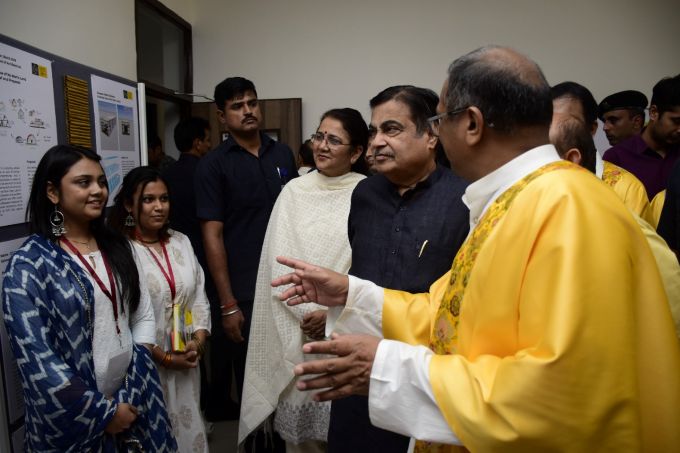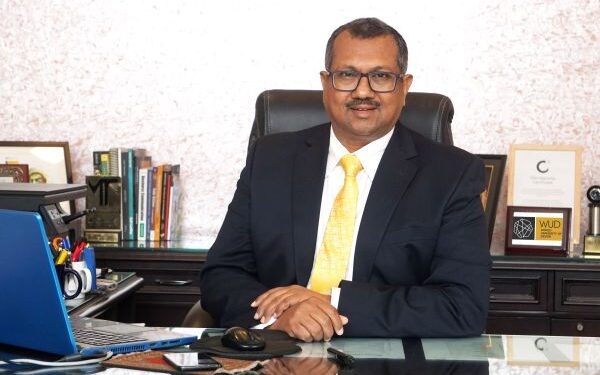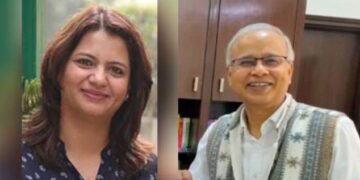Dr. Gupta, you’ve been a pioneer in bringing design education into the private higher education space in India. Seven years ago, you took a bold step by establishing a full-fledged university dedicated to design. Can you take us back to those early days? What inspired you, and what were the foundational decisions that led to the birth of WUD?
Ans. Yes, the journey of establishing the World University of Design was indeed both bold and deeply personal. Eight years ago, when we conceptualized WUD, the landscape of design education in India was still quite nascent, especially within the formal structure of universities. Design was often misunderstood as merely an auxiliary discipline—useful, but not central to mainstream education or nation-building. That perception, I felt, needed to change. The creative economy was already emerging as a powerful global force, yet India lacked a dedicated ecosystem to nurture creative talent at scale. This gap became both the inspiration and the imperative for founding WUD.
My journey in education showed me that design is more than a skill—it’s a powerful way to think, solve problems, and shape culture. After contributing to institution-building before, I wanted to create something new from the ground up—a university where design was the core philosophy, not a side offering. This vision led to the creation of WUD: a reimagined model of higher education built on creativity, critical thinking, and cross-disciplinarity, with the aim of placing India at the forefront of the global creative economy. Launching a design-focused private university wasn’t easy. With no clear regulatory path and most institutions focused on engineering, business, or law, the idea seemed unconventional. But that gap made our mission urgent. We collaborated with the Haryana government to align our vision with state policy and establish WUD as a multidisciplinary, degree-granting university with design at its heart.
From the start, we set out to be different, breaking down silos between disciplines like architecture, design, arts, and management to foster true collaboration. We prioritized not only technical skills but also cultural insight, sustainability, inclusivity, and global relevance. Our “campus without walls” shaped everything from programs to partnerships.
WUD’s boldness wasn’t just in launching a niche university, but in reimagining what higher education could mean for a young, ambitious India—placing creativity at the heart of development. And that vision is beginning to make an impact beyond our campus.
Reflecting on this journey, what has the experience been like—both for the institution and for the students? What kinds of challenges have you faced and how have you addressed them?
Reflecting on the journey of these initial cohorts at the World University of Design is both humbling and energizing. These students were true pioneers—just as much as we were. They chose to be part of an institution that was still shaping its identity, that didn’t yet have the advantage of legacy or the comfort of an established reputation. But in many ways, that shared sense of experimentation and belief created a powerful bond between the students, the faculty, and the institution itself.
For our students, the journey has been truly transformative. They’ve grown in a creative, collaborative, real-world learning environment—guided by expert faculty, exposed to diverse disciplines, and engaged with industry from the start. Many arrived with raw talent and left with clarity, confidence, and leadership skills.
For us, each graduating cohort is both a milestone and a mirror—highlighting what works and where we must grow. Their experiences push us to innovate, adapt curricula, expand infrastructure, and deepen industry ties, especially in fast-evolving fields like digital design and immersive media.
Starting a university from scratch brought challenges—building academic rigor, systems, credibility, and campus life all at once. We faced skepticism from parents and peers but countered it by proving design’s relevance across business, tech, policy, and more. Our strong placements and industry ties reflect that success.
The most rewarding outcome? A new generation of graduates—skilled, socially conscious, globally aware, and culturally rooted. They embody the WUD spirit: bold, creative, and ready for the future.

Design education in India has grown rapidly in terms of course offerings. However, faculty shortage, especially those with doctoral qualifications, remains a concern. How has WUD addressed this issue to maintain academic quality?
This is absolutely right—while the expansion of design education across India is encouraging, the challenge of building a strong academic faculty base, particularly with doctoral qualifications, remains one of the sector’s most pressing concerns. At WUD, we recognized this challenge early on and chose to address it with a long-term, multi-layered strategy focused on both faculty development and institutional innovation.
We chose depth over rapid scaling, focusing first on building a strong core faculty with both academic and industry expertise. Many of our senior members have global experience and lead with real-world insight, keeping our teaching relevant and rigorous.
To address the shortage of qualified design educators, we launched our own PhD program—cross-disciplinary, research-driven, and globally aligned yet rooted in Indian context. Our first PhD graduate’s work on Moroccan animated folktales reflects the kind of meaningful, culturally rich research we aim to foster.
We also made a conscious decision to treat faculty development as an ongoing institutional responsibility. We regularly invest in faculty upskilling—whether through collaborative research projects, international partnerships, or exposure to emerging domains like AI-driven design, sustainability practices, and immersive media. Faculty are encouraged to publish, exhibit, consult, and participate in conferences, and we support these activities institutionally because we know that a vibrant academic culture cannot be built without empowering the people who drive it.
To address gaps in specialized areas, we’ve adopted hybrid models—inviting visiting faculty, industry experts, and global collaborators to bring fresh perspectives and cutting-edge knowledge. This ensures students get rich learning experience despite talent shortages.
For us, faculty development mirrors our broader vision: design education must evolve, collaborate, and constantly reinvent itself. We see the faculty gap not as a limitation, but as an opportunity to innovate and lead.
WUD recently launched a B.Tech program. Can you share some insights into these new offerings? What kind of students are these programs designed for, and how do they integrate with your existing creative disciplines?
Launching the B.Tech programs at the World University of Design marks a significant step in our evolution as a design-led, future-facing institution. These programs were not an afterthought or a shift in direction; rather, they are a deliberate extension of our core philosophy that design, and technology are not just compatible, but inseparable in today’s innovative landscape.
We launched this program because we could clearly see the blurring boundaries between design, engineering, and digital technology. Industries today demand professionals who are not just technically proficient, but also creatively agile people who can code and conceptualize, who understand systems but also user experiences, who can solve problems at the intersection of logic and empathy. That’s exactly the kind of graduate we aim to nurture through our B.Tech in Computer Science & Design program.
The B.Tech in Computer Science & Design is crafted for students who are excited by both computation and creativity. It’s ideal for learners who are as comfortable thinking in algorithms as they are in aesthetics. The curriculum spans traditional computer science foundations—like programming, data structures, AI, and machine learning—but always in conversation with design thinking, user experience, digital product design, and emerging tech applications such as AR/VR, interaction design, and creative coding. This program appeals not just to those aspiring to be software developers, but also to those who want to shape the digital future through intelligent, human-centered systems.
What sets our tech programs apart is their deep integration with WUD’s creative ecosystem. Tech students collaborate with artists, designers, and strategists, gaining real-world experience on interdisciplinary projects like smart wearables, digital museums, and immersive theatre. This cross-pollination builds versatile, future-ready professionals fluent in both tech and creativity.
- You’ve also introduced a graduate program in Performing Arts. Does this include theatre, dance, music and other forms? We’d love to hear more about the structure and vision of this program.
Yes, the graduate program in Performing Arts at the World University of Design is built with a very clear and purposeful focus – to prepare our students not just to be accomplished performers, but to become professionals in their chosen fields—whether that be Dance, Music, or Theatre. We see performance not merely as a talent to be nurtured, but as a discipline that requires rigor, structure, and a deep understanding of its professional ecosystem.
Our goal is to ensure that students emerge from the program with the technical mastery and artistic confidence required of a strong performer—but also with the strategic thinking, industry awareness, and entrepreneurial skills necessary to build sustainable careers in the performing arts. Too often, gifted performers struggle to find their footing because they haven’t been prepared for the demands of the real world—auditions, funding models, contracts, intellectual property, production workflows, or the ability to work across platforms and audiences. At WUD, we consciously address this gap.
Our performing arts curriculum is both intensive and expansive, centered on studio practice—be it classical dance, theatre, or music—blended with training in theory, arts management, digital tools, and collaboration. Students graduate with a repertoire, a portfolio, a plan, and a network.
We promote interdisciplinary work, encouraging collaborations with peers in architecture, visual arts, design, film, and tech—preparing students for today’s hybrid cultural landscape. The goal: to produce expressive, adaptable, and industry-ready artists who are confident in both their craft and their career path.
As admissions for the new academic session begin, could you briefly walk us through the process—eligibility criteria, fee structure, and facilities such as hostel accommodation?
As we begin a new academic cycle at the World University of Design, we are once again opening our doors to a fresh cohort of aspiring creators, thinkers, performers, and problem-solvers across our diverse programs—ranging from design, architecture, and visual arts to business innovation, performing arts, and our newer technology-integrated degrees.
Our admissions process is designed to be inclusive, holistic, and talent-focused. For undergraduate programs, candidates must have completed their 10+2 or equivalent from a recognized board, while postgraduate applicants should hold a relevant undergraduate degree. For B.Tech programs, eligibility includes a science background with Physics, Chemistry, and Mathematics at the 10+2 level. In the Performing Arts, we welcome candidates from diverse academic backgrounds who can demonstrate a strong foundation and commitment in their chosen field—be it dance, music, or theatre.
The process typically involves our entrance test (WUDAT), followed by a personal interview and a portfolio or performance assessment, depending on the discipline. We’re looking not just for academic achievement, but for creative intent, curiosity, and the potential to grow within a dynamic learning environment.
One of our key founding principles has been accessibility—and this is reflected in our fee structure. We’ve deliberately kept our tuition fees 30–40% lower than those of comparable private and even the top government institutions offering design or creative education. We strongly believe that high-quality education should not be the privilege of a few, and affordability should never be a barrier to talent. In addition, we offer a range of merit-based scholarships, need-based financial aid, and targeted support for students from underrepresented communities or emerging creative disciplines.
Our campus is fully residential, offering secure and comfortable hostel accommodation for both male and female students. The facilities are modern and student-friendly, with well-furnished rooms, 24/7 internet access, and vibrant common areas that encourage community living. Beyond the hostels, the campus is designed to foster interdisciplinary learning—with open studios, labs, exhibition spaces, a lively café, sports facilities, and several informal zones that serve as platforms for collaboration and cultural exchange.
From the very first step of admission to the immersive campus experience, everything at WUD is centered on providing a nurturing yet challenging environment where talent can thrive, unfettered by financial or structural limitations.













